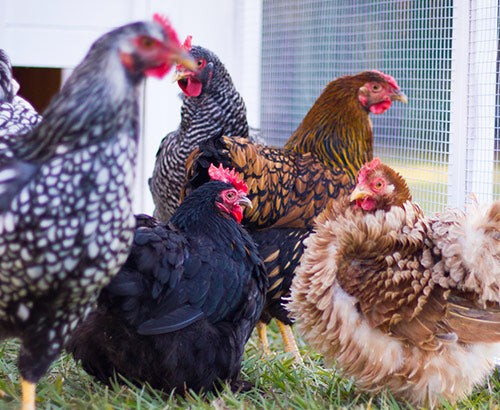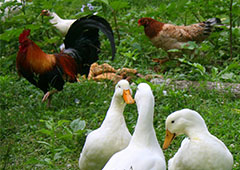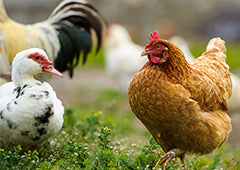You’ve been happily keeping chickens for a while now and it’s great fun. Something’s missing though. You can’t quite put your finger on it, until…you wake up from a dream where all of your chickens were walking around with webbed feet. Hmm, that’s a bit puzzling. Or does the idea of wacky little web- footed ducks splashing around in a pond get you absolutely giddy? If so, let’s chat about egg-spanding your flock with…wait for it…DUCKS!
Many chicken keepers eventually add ducks to their flock. It’s only natural as chickens and ducks share very similar living conditions. And, while ducks do tend to be a tad messy, what with the water, and the splashing, and the mud...they do make congenial companions for your chooks.
While integrating chickens and ducks is a manageable process, in order for chickens and ducks to co-egg-xist harmoniously they must have LOTS of living space. Also there are some slight differences that you’ll need to take into consideration: type of feed/nutrition needed, nesting needs, sleeping arrangements, and the inevitable clash of the dust bath vs the water bath.
Space
Okay, so, chickens and ducks need lots of space. A good idea then is to allot a bit more than enough space-just like the cliché says, “Better safe than sorry”. Since chickens and ducks generally require about .37 meters of space per bird in the coop and about .93 meters in the run, add a square meter or two of extra space in each. Why is space so important? Squabbles will be less of an issue with ample space to escape a bossy coop mate. We all know that squabbles are a natural part of raising chickens; however, when you add some web footed quackers into the mix, a completely different species, it just makes good sense to give them space!
Feed/Nutrition
Let’s move on to feeding your cluckers and quackers. Thankfully, both chickens and ducks can eat chicken feed. Yay! However, there’s more to it than that. Both types of birds are fully feathered and ready to live outdoors at eight weeks. At this stage of their development and up until they reach eighteen weeks old, they can both eat grower feed. Once they are eighteen weeks old, switch to layer feed. Just one glitch- layer feed contains too much calcium for ducks, so you need to provide a supplement of wheat for your water lovin’ birds. But, if your hens eat too much wheat and thus, don’t get sufficient amounts of protein that they would from eating just layer feed, egg production will suffer. The solution is simple, -place the wheat in a shorter bucket and cover with water. The wheat will fortunately sink to the bottom allowing the ducks access to all they can eat, while keeping your chooks from pecking and snacking on it.

Nesting
Nesting needs are easily managed also. Duck nesting areas should be on the ground. Chicken nesting boxes on the other hand, should be at least a few inches off the ground, but can be higher. So, perhaps place your chicken’s nesting boxes above the duck’s nesting area, otherwise chooks will most likely wander into the duck’s nests, scratching and pecking,
When it’s time, chickens instinctively put themselves to bed. Ducks usually do not. Ducks do tend to enjoy sleeping outdoors no matter what the temperature. So, if your ducks typically free range during the day, you will probably have to herd them inside at dusk. If they prefer to be amateur astronomers and star gaze, they’re free to waddle into their run.
Bathing
Last but certainly not least- the dust bath vs the water bath. Obviously the two do not mix well. Well, they do, but the end result is just plain muddy! So, you’ll want to keep a good distance between these two favorite activities. Remember though, that chickens cannot swim! So, please be sure to use a shallow bath for the ducks, so your innocent and inquisitive chooks don’t accidentally hop up onto the rim, end up going for an unexpected swim and are unable to get out.
So, this is all so very egg-citing, hmm? Just imagine…DUCKS waddling around amongst your cherished chooks! Oh, boy! Even more egg-citing, though, is housing your new quackers right alongside your chooks in one of the egg-cellently made coops from Backyard Chicken Coops. Backyard Chicken Coops will bring your daydream alive with their wonderful and innovative coops created and crafted to provide all of your birds a lovely and safe place to call home.
As chicken keepers, we want harmony amongst our chooks and other feathered friends. Therefore it's so important that we do an eggcellent job when caring for them. There are so many things to consider when becoming a chicken parent from other pets to health issues. Many chicken keepers struggle to handle chicken health or behaviour issues, especially in the first few years of having a flock.
This is why I recommend Chickenpedia to all my readers. They have comprehensive online courses on everything you didn’t know you need to know and then some more! From healthcare to raising baby chicks to feeding and behavior, you’ll find beginner-friendly courses that’ll give you the knowledge and confidence to successfully look after your chickens.
As a member, you will get access to ALL their fantastic courses. No need to wing it, become the ultimate chicken eggspert! Check out Chickenpedia today!


















